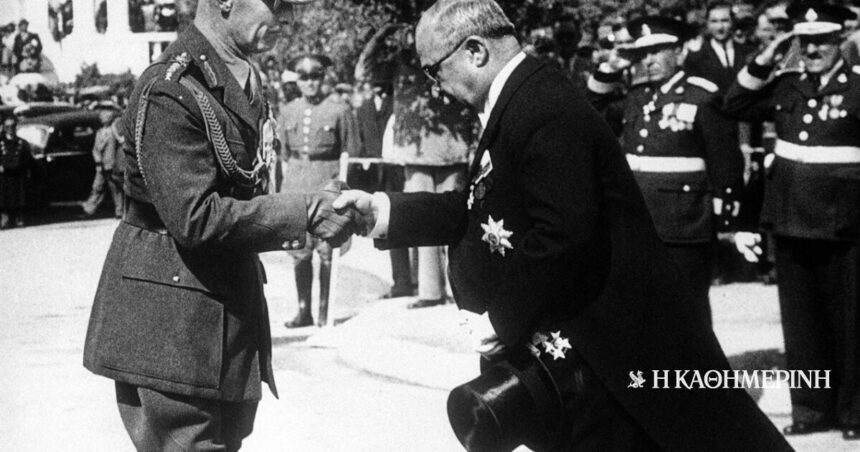Those who persist in denying the Ioannis Metaxas the glory of “No” they ignore a text that should be known, well known. In fact, it has been published since 1960 in volume IV of “Calendar» of (Ikaros publications). This is his shorthand confidential speech to the owners and editors of the Athenian press, on October 30, 1940, two days after “No”. With this confidential speech he wanted to ensure their wholehearted participation in the war effort.
So he told them that he foresaw with certainty the final victory of the “Anglo-Saxon world.” He thus had the conviction that Greece, even “temporarily enslaved” during the war, would eventually be in the victors’ camp and even enlarged, at least as far as the Dodecanese – which is exactly what happened.
He didn’t want them to think his ‘No’ decision was ‘made in an instant’nor that everything that could be done to avoid war was not done. Greece could avoid him only by voluntarily joining the “New Order” of the Axis and indeed by voluntarily mutilating it in favor of Italy and Bulgaria. This is what Germany had told Metaxas.
“In other words, in order to avoid war, we should become voluntary slaves and pay this price by laying out the right hand of Greece to be amputated by Italy, and the left hand by Bulgaria.”
But in this case, Metaxas predicted the disintegration of the state, as in 1916. With the support of Great Britain and the cover of its fleeta new “Provisional government» in island Greece at least, to fight again in the name of the betrayed Nation.
Marked by the National Divide, Metaxas was now fully aware of his own responsibilities at the time. He was therefore determined to prevent the recurrence of the Division in World War II. What he said on October 30 can be considered a substantial declaration of the end of the National Division by its last surviving protagonist.
His shorthand confidential speech to the owners and editors of the Athenian press, on October 30, 1940.
He asked at one point: “I don’t know if any of you Anti-Venizelians are always and intransigent.” “It’s me, Mr. President,” replied Nikolaos Kraniotakis. Then Metaxas said:
“Well listen up so we can get along. I, gentlemen, as I have sufficiently explained to you, have until now observed the policy of the late King Constantine, that is, the policy of strict neutrality. I did everything to keep Greece away from the clash of the great giants. Already, after the unjust attack of Italy, the policy I am following is the policy of the late Venizelos. Because it is the policy of identifying Greece with the fate of the Power, for which the sea has always been, as it is for Greece, not the barrier that separates, but the liquid avenue that connects. […] Through Greece, England is the natural friend and repeatedly proved to be a protector, and sometimes the only protector”.
Already in the fall of 1936, Metaxas had assured the leadership of the Navy in confidence that, in the event of war, Greece would definitely be on England’s side.
However, neither the greatness of his decision to say “No” nor the subsequent Palladian support in his person managed to free Metaxas from his psychopathology and above all from his abysmal insecurity. This prevented him from preparing the country – not militarily, but politically, especially for the eventuality that it would be under enemy occupation, as he himself predicted. The occupation and occupation of other small countries by the Germans had long preceded, offering a variety of instructive examples. In contrast, however, with other kingdoms, Greece entered the war with a king disputed even by royalists and with a regime not only dictatorialbut also so personal that it was doomed to disappear with the death of the dictator, as he himself foresaw and as actually happened.
Even at the last moment, Metaxas did not do the least to expand his government. He did not even think of making provision for his succession, although he sensed that his end was near.
Thus, with the death of Metaxas on January 29, 1941 and with the complete lack of a real replacement, a rapid and unstoppable decay began, which accelerated after the German invasion. In Greece, the Occupation did not simply entail a power vacuum, as in other occupied countries with governments-in-exile. It rekindled an infinitely more morbid crisis of legitimacy, which had been lurking since 1935. Thus, Aiolos’ pocket was opened for civil conflicts very different from those that Metaxas imagined and wanted to prevent.
Professor George T. Mavrogordatou’s most recent book is “National Integration and Discord: The Greek Case”.
Main photo. Ioannis Metaxas with King George II, in 1938. What he said two days after “No” can be considered a substantial declaration of the end of the National Divide by its last surviving protagonist. [A.P.]








